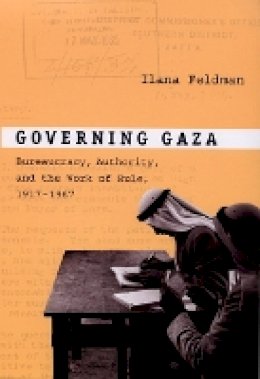
Governing Gaza: Bureaucracy, Authority, and the Work of Rule, 1917–1967
Ilana Feldman
Drawing on archival research in Gaza, Cairo, Jerusalem, and London, as well as two years of ethnographic research with retired civil servants in Gaza, Feldman identifies two distinct, and in some ways contradictory, governing practices. She illuminates mechanisms of “reiterative authority” derived from the minutiae of daily bureaucratic practice, such as the repetitions of filing procedures, the accumulation of documents, and the habits of civil servants. Looking at the provision of services, she highlights the practice of “tactical government,” a deliberately restricted mode of rule that makes limited claims about governmental capacity, shifting in response to crisis and operating without long-term planning. This practice made it possible for government to proceed without claiming legitimacy: by holding the question of legitimacy in abeyance. Feldman shows that Gaza’s governments were able to manage under, though not to control, the difficult conditions in Gaza by deploying both the regularity of everyday bureaucracy and the exceptionality of tactical practice.
Product Details
About Ilana Feldman
Reviews for Governing Gaza: Bureaucracy, Authority, and the Work of Rule, 1917–1967
Micaela Sahhar
The Australian Journal of Anthropology
“Ilana Feldman’s book is a nuanced and illuminating attempt to understand the persistent forms of bureaucratic rule that have taken shape in the Gaza Strip. . . . This is a well-written and sophisticated blend of ethnography and history that sheds invaluable light on the Gaza Strip. It will be of interest to those with a specific interest in the region, as well as those grappling with issues of bureaucracy and political rule more generally.”
Tobias Kelly
American Ethnologist
“In this monograph—one impressive in its meticulous attention to historical detail, its artful melding of ethnography and history, and its skillful engagement with a wide range of scholarly literatures—Feldman contends that the case of Gaza does much to illuminate both an understudied aspect of Palestinian history and the often fragile and makeshift nature of government bureaucracy per se. . . . What Governing Gaza provides is not merely the ethnographic and historic basis for a rethinking of the very notion of ‘government’—a shift from an aggregate institution to a body of ordinary practices—but also a vision of everyday Gaza that most scholars have neglected.”
Rebecca L. Stein
American Anthropologist
“Governing Gaza, Ilana Feldman's meticulously researched, well-argued and fluidly written book, is that rare thing: an historical ethnography of the instruments and institutions of bureaucracy beyond the bounds of Europe. What makes the book particularly important is its long time span. . . .”
Laleh Khalili
TLS
“A fascinating and sophisticated examination. . . . The richness of this study is in the mundane, in its reflections on, and deep understanding of, people’s lives and work as government employees. . . . By making Gaza seem normal, Feldman enables us to see beyond the current headlines and fearful murmurings.”
Rochelle A. Davis
Journal of Palestine Studies
“Feldman’s conclusion is powerful not just for her exploration of Gaza during these two important periods in its history, but for her keen insights about current conditions in the region relative to bureaucracy. . . . This book contributes to our understanding of Gaza from an under-explored level of analysis, and is also significant because it furthers our understanding of what it means to be a Palestinian from Gaza.”
JoAnn Digeorgio-Lutz
Middle East Journal
“In her remarkable and thoroughly researched book, Governing Gaza, Ilana Feldman unravels the relational aspects that underpin the governing of Gaza through defining periods in its history. . . . Feldman uses archival materials, interviews, and in-depth historical analysis in her meticulous examination of patterns of governance. . . . Her thorough approach makes this book compellingly useful to policymakers, social anthropologists and historians. . . . Feldman’s book deserves a wide reading; it is modest in tone and acutely rigorous in argument and presentation.”
Atef Alshaer
H-Net Reviews
“In revealing the regularity, singularity, contradiction, continuity, and rupture at the heart of governing Gaza, Feldman’s original and important book has much to teach scholars of the colonial and postcolonial world, as well as scholars concerned with the historicity and ethnography of government as such.”
Omnia E. Shakry
American Historical Review
“This innovative and well-written book has brought to the fore immense detail, scholarly rigor of the first order, and a subtle but substantial political commitment that unearths the genealogy of adversity for residents of Gaza. . . . Feldman’s Governing Gaza, is a superb and imaginative piece of scholarship. As thorough and fascinating an ethnohistory related to Palestine as any other this reviewer has seen.”
Thomas Abowd Anthropological Quarterly
